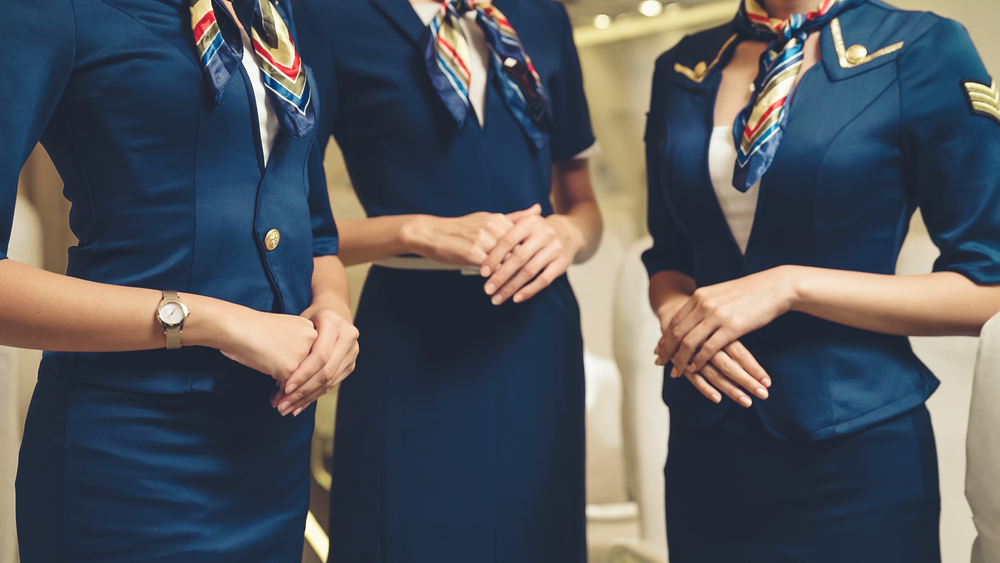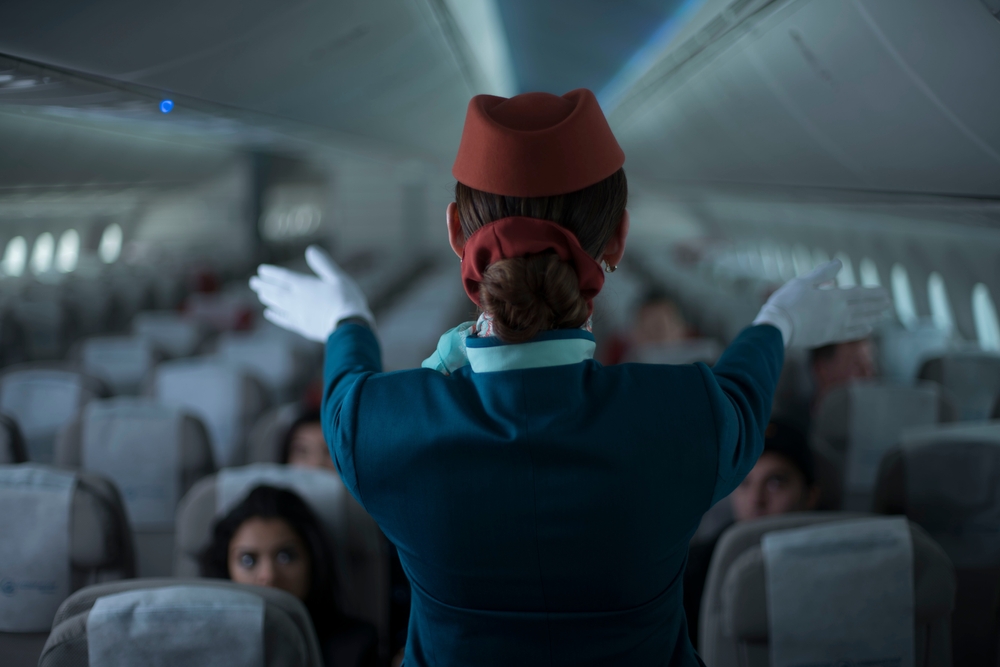How much do cabin crew earn? It is a question many aspiring flight attendants ask online. A cabin crew salary varies widely depending on the airline, location, and experience level. Some airlines offer tax-free pay and free accommodation, while others provide higher hourly wages with extra perks.
According to Glassdoor, cabin crew salary in the UK is between £39,000 and £52,000 ($52,000 – $70,000), whereas in the US, it ranges from $48,000 – $89,000. BAA Training notes that the profession is facing a surge in base salary, with some 600,000 new crew members needed over the next 10 years.
While it’s not the highest paying aviation job, working as cabin crew can be incredibly rewarding. We break down cabin crew salary levels worldwide, helping you decide if this career is a good fit for you..
Table of Contents
What affects cabin crew salary?
1. Airline type
Cabin crew salaries are influenced by a mix of factors that can totally change the compensation game. One of the biggest influences? The airline type. Major full-service airlines tend to pay much higher wages than budget carriers.
You might be wondering, why is that? Well, full-service airlines come with bigger operational costs, which include high-level in-flight services, premium amenities, and a top-tier experience for passengers. To cover those costs, full-service airlines need to offer solid pay to attract skilled and experienced cabin crew who can keep the high standards in check.
But wait, there is more! Major airlines also operate long-haul international flights. These flights demand more crew and longer hours, and with more hours come bigger paychecks. Plus, you get extra perks like per diems and layover bonuses. Since these routes are tougher and more demanding, airlines offer higher pay to make it all worthwhile.
2. Cabin crew experience level
Experience plays a major role in shaping cabin crew salary levels. The more experience you gain and the more responsibilities you take on, the higher your pay will be. Senior cabin crew members consistently earn a higher hourly rate than those just starting. But why is this the case? It is all about the extra responsibility and the valuable experience they bring to the table.
Experienced crew members do not just follow the routine. They manage the team during flights, support less experienced colleagues, ensure passenger safety, and step up during emergencies. These critical roles require advanced problem-solving skills and a deep understanding of internal flight procedures. No wonder senior crew members earn more! They are the ones holding everything together, often in high-pressure moments.
The perks do not stop at a higher hourly rate. On top of this, senior crew members often have the advantage of additional benefits. Want priority for preferred flight assignments or a more flexible schedule? Senior crew members usually get this. As you build more experience, you can expect a more rewarding and well-compensated career.
3. Base location
Where the job is based can have a big impact on cabin crew salary. Pay rates differ depending on the region, influenced by the cost of living, local laws, and the demand for jobs.
For instance, crew members in expensive cities often earn more than those in smaller towns with lower living costs. Airlines must adjust their pay to help their crew cover the higher expenses for things like housing, transportation, and everyday life in bigger cities. Local labor laws and wage standards also play a big role. In countries with strong minimum wage laws, airlines often need to offer higher pay and better benefits to meet these regulations.
When choosing an airline, it is important to consider the location of its hub as well. International hubs, which handle long-haul flights, need an experienced crew to manage more demanding routes. Airlines offer higher pay to attract skilled professionals for these high-pressure jobs. On the other hand, airlines based at smaller regional airports or domestic hubs tend to offer lower cabin crew salaries since their routes are less complex and do not require the same level of expertise.
4. Impact of cabin crew unions
Union agreements matter, especially in airlines with strong cabin crew unions. Unions fight for higher wages, ensuring members earn competitive and fair salaries. They also secure regular pay raises, helping members keep up with inflation and rising costs.
Unions work to improve flight attendant working conditions too. They push airlines and governments for better rest periods, reasonable schedules, and stronger job security. These efforts can create a better work-life balance.
5. Cabin crew contract type
Flight attendant jobs offer different contract types, and each one affects pay, benefits, and job stability. These factors influence how much you can earn. For instance, permanent contracts provide steady pay at an industry-average rate and offer the most job stability. On the other hand, fixed-term contracts often offer lower pay. Since the job is temporary, benefits may be limited or not included, depending on the airline.
But if you are aiming for the highest possible hourly pay rates, you should think about seasonal contracts. They often offer the highest pay rates, with some airlines providing bonuses for working during peak seasons. However, these contracts are only for busy periods, so job stability is limited.
6. Additional benefits to the base salary
A cabin crew salary not only includes a base salary, but also allowances like per diems and layover bonuses, and extra benefits. But what really boosts the overall compensation? Perks, for starters! Some airlines offer free stays at luxurious hotels during layovers, saving crew members a significant amount on accommodation.
Bonuses and commissions are another way to increase earnings. Some airlines reward cabin crew for selling duty-free products or in-flight services, giving them a chance to make extra cash. And let’s not forget the free or discounted flights! Crew members often enjoy discounted travel, and in some cases, they can bring a guest along for the ride.
7. Extra flights & overtime
Finally, cabin crew members can increase their income through overtime and extra flights. Those willing to take on additional shifts or standby duties can expect to see their pay increase, as these extra hours often come with a premium rate. In some cases, this can add hundreds to their monthly income, particularly if they frequently pick up extra shifts or work high-demand routes.

How much can you make as a cabin crew?
Now that we have covered the key factors impacting cabin crew salaries, let’s take a closer look at the figures you can expect to see in your paycheck when working as a cabin crew member in different countries.
Europe
Similar to other regions, in Europe, a full-time crew member usually earns around €30,000 per year, though actual pay depends on the airline. For instance, in Austria, a cabin crew member’s estimated total monthly pay is €2,240, comprising an average salary of €1,400 and additional pay of €840. In Brussels, Belgium, the estimated total monthly pay is €2,400, with an average salary of €1,600 and additional pay of €800. At Wizz Air in Italy, the average annual salary for cabin crew is around €13,443. However, in some major cities, for example in Rome, a cabin crew earns an average of €22,800 per year.
Looking further, Lufthansa Group cabin crew in Germany have an average salary of €24,500 per year. At Eurowings, cabin crew earn between €17,000 and €19,000 annually, with an average base salary of €18,000. Air Europa offers cabin crew an average yearly salary of €30,000, with additional pay averaging €2,000. To compare, at Lauda Europe, senior cabin crew members have an estimated total annual pay of £28,200, including a base salary of £20,172 and additional pay of £8,029. Aer Lingus offers a competitive annual salary of €29,883.26 plus variable pay of €6,500, while Swiss Airlines in Switzerland offers some of the highest earnings – €43,000 in base salary, with total pay reaching €52,000. However, these figures represent pre-tax earnings so that actual take-home pay can be lower.
Middle East
In the Middle East, airlines like Emirates and Qatar Airways attract crew with tax-free salaries and generous perks. Base salaries range from €20,000 to €63,000 per year. But that is not all. These airlines also cover major expenses like accommodation, food, and transportation. With fewer personal costs and no income tax, crew members can save a significant portion of their earnings.
Australia
For those considering Australia, on average, entry-level flight attendants at Qantas Airways can expect to earn around €30,000 to €36,000 per year. Experienced crew members may earn up to €48,000 to €60,000 annually, including allowances and bonuses. Salary can also differ depending on the type of flights worked (domestic vs. international) and additional benefits like meal allowances, accommodation, and travel perks. To compare, at Jetstar, cabin crew salaries vary between €24,400 and €48,800, depending on location and contract type.
United States
In the United States, cabin crew pay depends heavily on experience. The median salary sits at €51,850 per year. Entry-level crew earn around €21,900, while senior flight attendants can make up to €51,160 annually.
Asia
Looking at Asia, Singapore Airlines offers junior cabin crew a base salary between €15,600 and €27,300 per year. Senior crew can earn up to €39,000, depending on experience. In Hong Kong, Cathay Pacific pays for junior crew members from €23,000 annually.

So, where you work as a cabin crew member, the type of contract you have, and the additional benefits your employer provides all play a big role in determining your salary and savings potential. Whether it is tax-free perks in the Middle East, high pay in Switzerland, or cost-covered benefits in Asia, each region offers a unique financial opportunity for you.

